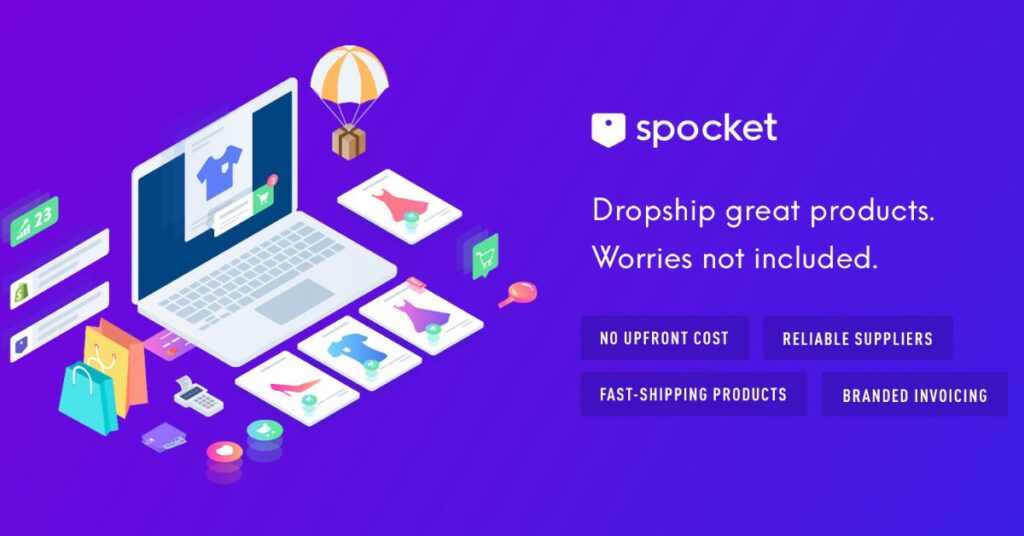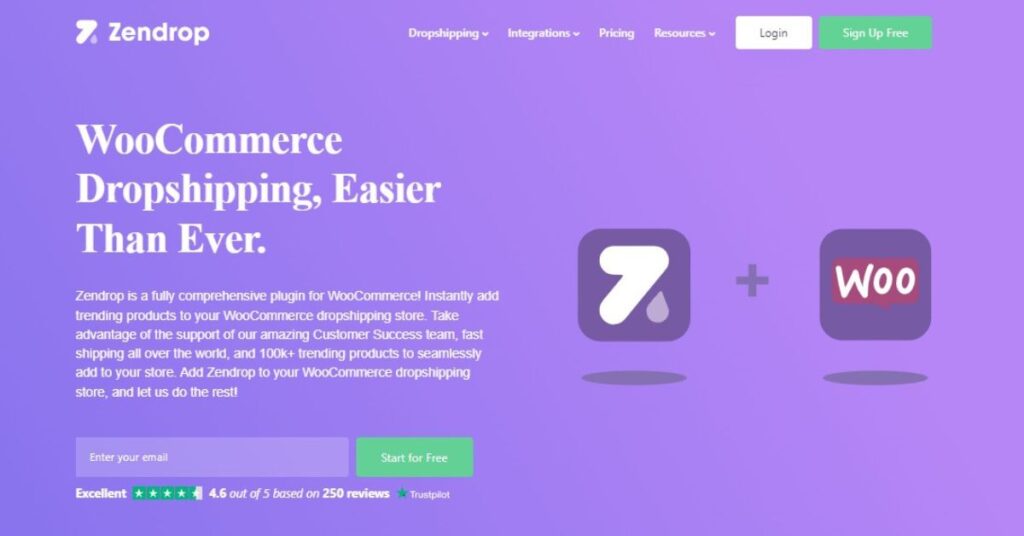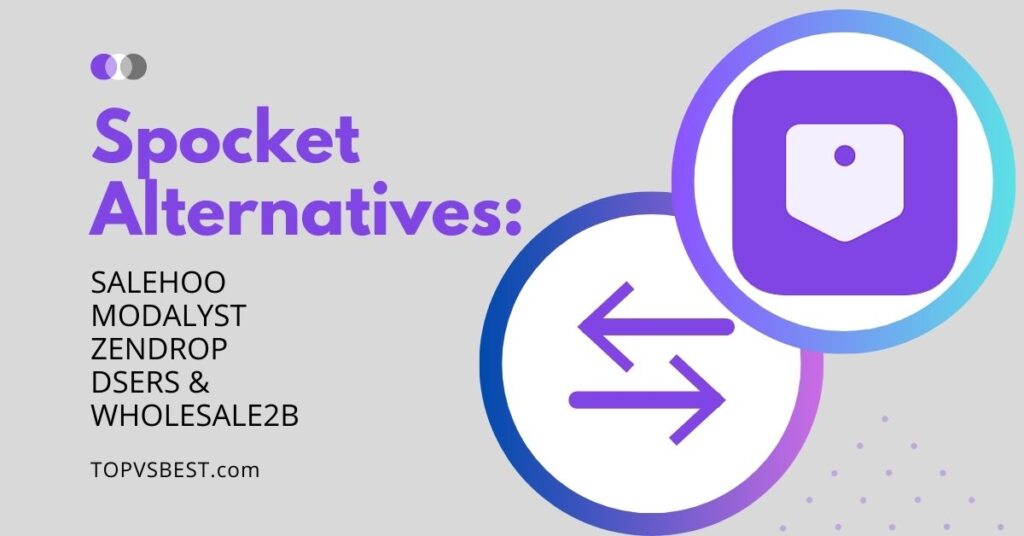Overview
In the ever-evolving landscape of eCommerce, dropshipping has emerged as a revolutionary business model, allowing entrepreneurs to set up and run online stores without the burden of managing physical inventory.
The success of any dropshipping venture hinges on the choice of a reliable platform to source products efficiently.
While Spocket has been a popular choice, exploring alternatives that might better align with your business needs is always wise.
In this blog post, we delve into five notable Spocket alternatives – SaleHoo, Modalyst, Zendrop, DSers, and Wholesale2B – to help you decide on the platform that best suits your dropshipping ambitions.
Let’s dive into the world of dropshipping alternatives and discover which one could potentially unlock your eCommerce success.
Want to know more about Spocket? Read our Spocket Review.
Alternative 1: SaleHoo
SaleHoo serves as both a wholesale supplier directory and an online community. It provides access to a substantial database of suppliers and a diverse array of products.
SaleHoo facilitates connections between dropshippers and verified suppliers through its platform, ensuring a secure transaction environment.
The advantages of using SaleHoo for dropshipping include a wide product selection and access to reliable suppliers.
However, potential drawbacks include the need for careful supplier vetting and a membership fee.
Membership cost for Directory is $67 per year, granting entry to their supplier database and community resources. SaleHoo Dropship ranges from $27-$97 a month. Additional charges may apply for certain services.
In summary, SaleHoo offers a comprehensive supplier directory and community platform that connects dropshippers with verified suppliers. Its strengths include product variety and supplier reliability, but users should consider the membership fee and potential extra costs.

Alternative 2: Modalyst
Modalyst specializes in linking eCommerce stores with dependable suppliers. Its curated marketplace features a diverse range of unique and trendy products.
The platform offers advanced features such as Print-on-Demand and automated order fulfillment to streamline operations.
Modalyst is valuable for dropshipping due to its curated product selection and automation capabilities.
Nonetheless, users should assess the subscription costs and transaction fees associated with the platform.
Modalyst’s pricing structure includes Free Hobby, Start Up ($35 per month), and Pro ($90 per month) plans, catering to different business needs.
In brief, Modalyst focuses on connecting eCommerce stores with distinctive products and streamlined order fulfillment. Its strengths encompass product curation and automation, although subscription costs should be considered when evaluating its suitability for dropshipping operations.
Alternative 3: Zendrop

Zendrop stands out as a comprehensive platform for dropshipping operations. It simplifies sourcing, order fulfillment, and business scalability.
With features like one-click product importing and automatic fulfillment, Zendrop streamlines the dropshipping process.
For dropshipping purposes, Zendrop proves effective due to its user-friendly features, branding, and integration with popular eCommerce platforms.
Warehouses located in the USA – mean fast, reliable shipping.
Nevertheless, users should consider the pricing structure. Zendrop’s pricing includes Free, Pro ($49 per month), and Plus ($79 per month) plans, with potential transaction fees.
In summary, Zendrop offers a holistic solution for dropshipping, focusing on efficient product sourcing and order management. Its benefits lie in user-friendly features and platform integration, although users should weigh the pricing options, including potential transaction costs.
Want to know more about Zendrop? Read our Zendrop Review.

Alternative 4: DSers
Since Oberlo has been taken down from Shopify, they have introduced a new enhanced dropshipping solution known as DSers.
DSers serves as a valuable tool for seamlessly integrating AliExpress with Shopify and other platforms, streamlining the process of managing product imports and order fulfillment across multiple eCommerce channels. This integration enhances operational efficiency and facilitates cross-platform management for dropshipping businesses.
DSers provides a 14-day free trial with three plans. The Basic plan, free to install, offers bulk order processing and basic mapping for managing 3 stores and 3,000 products.
The Advanced plan costs $19.90/month, including advanced features and management of 10 stores and 20,000 products, while the Pro plan is priced at $49.90/month, featuring advanced functions and management of 25 stores and 75,000 products. Extra fees apply for exceeding product limits and can be obtained through support contact.
In summary, DSers introduces a promising alternative for dropshipping companies. With its emphasis on order management and automation, it aligns well with the requirements of eCommerce ventures.
Alternative 5: Wholesale2B
Wholesale2B presents a comprehensive dropshipping solution, offering a wide range of integrated suppliers and products.
Its platform is designed to automate inventory synchronization and streamline business operations.
Wholesale2B is beneficial for businesses of varying sizes due to its extensive supplier network and automation features.
However, users should take note of the pricing structure. Wholesale2B’s pricing includes multiple tiers, such as the Dropship eCommerce Plan for your existing stores and marketplaces ($37.99 per month) and Dropship Plan with store included ($49.99 per month), with additional charges for specific services.

In summary, Wholesale2B caters to diverse dropshipping needs through its integrated suppliers and automation capabilities. Its merits lie in supplier variety and automation, while the pricing structure, including plan costs and potential extra charges, should be weighed when assessing its suitability.
Comparative Analysis
When comparing these dropshipping alternatives – SaleHoo, Modalyst, Zendrop, DSers, and Wholesale2B, several factors come into play.
These tables provide a quick overview of the strengths, weaknesses, and costs associated with each dropshipping alternative, assisting you in making an informed decision based on your business needs.
Table 1: Features and Pricing
| Alternative | Features | Pricing |
| SaleHoo | – Wholesale supplier directory- Online community- Diverse products | Membership: $67/yearDropship: $27-$97/month |
| Modalyst | – Linking eCommerce stores- Unique & trendy products- Automated order fulfillment | Free, Start Up: $35/month, Pro: $90/month |
| Zendrop | – Comprehensive platform- One-click product importing- Automated fulfillment | Free, Pro: $49/month, Plus: $79/month |
| DSers | – Seamless AliExpress integration- Enhanced order management- Multi-platform support | Basic: Free, Advanced: $19.90/month, Pro: $49.90/month |
| Wholesale2B | – Comprehensive solution- Integrated suppliers & automation | Dropship eCommerce: $37.99/monthDropship Plan with store: $49.99/month |
Table 2: Pros, Cons, and Suitability
| Alternative | Pros | Cons | Suitability |
| SaleHoo | – Wide product selection | – Need for careful supplier vetting | Prospective suppliers & diverse products |
| Modalyst | – Unique & trendy product sourcing | – Subscription costs | Distinctive product sourcing |
| Zendrop | – Efficient order management | – Pricing considerations | Effortless order management |
| DSers | – Seamless integration | – Additional charges for limits | Enhanced cross-platform management |
| Wholesale2B | – Supplier diversity | – Subscription charges | Varying business sizes |
Spocket Alternatives: FAQs
Comparing Oberlo and Spocket, it’s important to note that Oberlo has been discontinued. Spocket stands as a popular and active dropshipping platform, offering advanced features to streamline order fulfillment and sourcing. With its ongoing development and user-friendly interface, many find Spocket to be a great option for modern dropshipping needs.
Certainly, there are alternative business models that might offer greater profit potential than dropshipping. Branding and utilizing Amazon FBA (Fulfillment by Amazon) are examples. These methods can lead to higher profits due to a stronger brand identity and Amazon’s extensive customer base. However, it’s important to note that these approaches often require upfront costs for product development, inventory management, and fulfillment, which contrasts with the lower initial investment typically associated with dropshipping. The choice ultimately depends on your resources, goals, and risk tolerance.
Yes, Spocket is generally considered a good dropshipping supplier. It offers a range of benefits, including a wide product selection, fast shipping options, and a user-friendly interface. Spocket’s integration with various eCommerce platforms makes it an attractive choice for those seeking reliable and efficient dropshipping solutions.
Spocket and Syncee are both dropshipping solutions, but they differ in various aspects. Spocket focuses on connecting dropshippers with suppliers offering fast shipping from the US and EU, enhancing delivery times. Syncee also is a global dropshipping 2B2 solution assisting in importing and managing products from various suppliers. The choice between them depends on your specific needs and priorities.
Remember, the choice between different platforms and models depends on your business goals, preferences, and the specific features you’re looking for in a dropshipping solution.

Conclusion
In the dynamic world of dropshipping, having the right tools at your disposal can make or break your eCommerce venture. The alternatives we’ve explored – SaleHoo, Modalyst, Zendrop, DSers, and Wholesale2B – each bring unique strengths.
Whether you’re seeking a vast supplier network, automated order fulfillment, seamless integration, or cost-effective solutions, these platforms cater to diverse business requirements.

As you venture into your dropshipping journey, remember that success is a fusion of careful planning, strategic execution, and the right tools. The “one-size-fits-all” approach doesn’t apply here; rather, it’s about finding the alternative that aligns best with your niche, ambitions, and operational style.
Ultimately, the choice between these alternatives boils down to your preferences and business goals. Take the time to assess the features, costs, and suitability of each platform, considering factors such as product range, supplier reliability, and ease of use.
By doing so, you’ll empower yourself to craft a dropshipping journey that’s efficient and capable of turning your eCommerce dreams into reality. Happy dropshipping!



